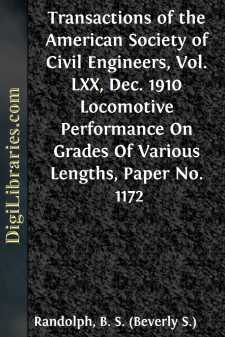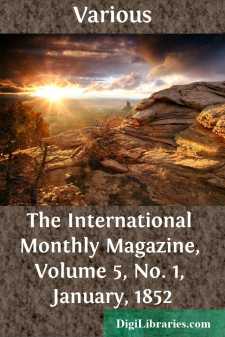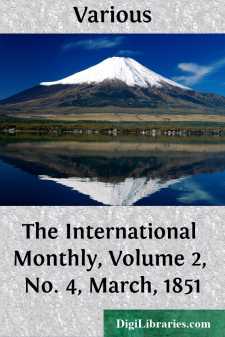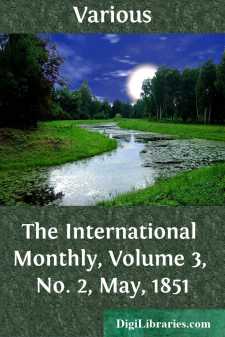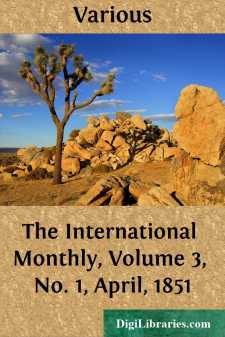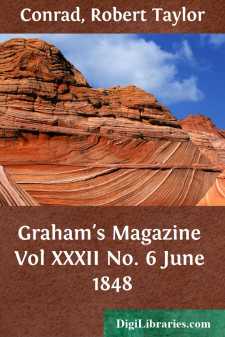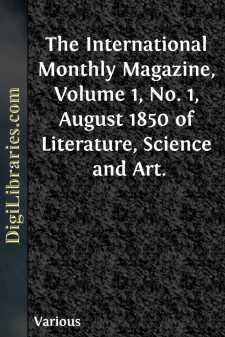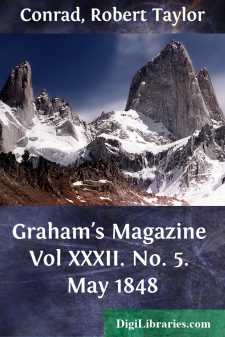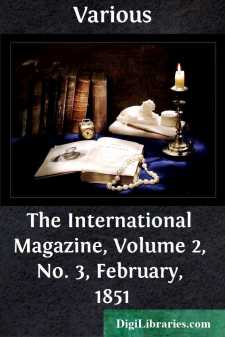Periodicals
- Art 27
- Children's periodicals 59
- Entertainment 5
- Food/Wine 2
- Games/Humor 455
- General 661
- Health 1
- History 53
- House/Home 1
- Regional 62
- Science/Nature 118
- Transportation 10
Periodicals Books
Sort by:
In the location of new railways and the improvement of lines already in operation, it is now well recognized that large economies can be effected by the careful study of train resistance due to grades and alignment, distributing this resistance so as to secure a minimum cost of operation with the means available for construction. While engaged in such studies some years ago, the attention of the writer...
more...
by:
Various
KOSSUTH. On the preceding page is the best portrait we have seen of the illustrious Hungarian, whose presence in America is destined to mark one of the brightest pages in the history of Liberty. Of his personal appearance we transcribe the description in the Tribune. He is taller than had generally been supposed, and his face has an expression of penetrating intellect which is not indicated in any...
more...
by:
Various
AUSTEN HENRY LAYARD, LL. D. In an early number of the International we had the satisfaction of printing an original and very interesting letter from Dr. Layard, in which, with more fulness and explicitness than in his great work on Nineveh, he discusses the subject of Ancient Art. We have carefully noted from time to time his proceedings in the East, and our readers will remember that we recently gave...
more...
by:
Various
GEORGE WILKINS KENDALL. We have here a capital portrait of the editor in chief of the New Orleans Picayune, George W. Kendall, who, as an editor, author, traveller, or bon garçon, is world-famous, and every where entitled to be chairman in assemblies of these several necessary classes of people. Take him for all in all, he may be described as a new Chevalier Bayard, baptized in the spirit of fun, and...
more...
by:
Various
JAMES FENIMORE COOPER. The readers of the International have in the above engraving, from a Daguerreotype by Brady, the best portrait ever published of an illustrious countryman of ours, who, as a novelist, take him all in all, is entitled to precedence of every other now living. "With what amazing power," exclaims Balzac, in the Revue de Paris, "has he painted nature! how all his pages...
more...
Time and opportunity make men—and high talent in any profession or sphere of life is valueless unless called into action. This is strikingly exemplified in the career of the person with whom we now have to do. Samuel Walker was born in the county of Prince George, Maryland, in the year 1815. His family, though respectable, had neither fortune nor influence sufficient to advance his interests; and at...
more...
by:
Various
Of the revolutions of the age, one of the most interesting and important is that which has taken place in the forms of Literature and the Modes of its Publication. Since the establishment of the Edinburgh Review the finest intelligences of the world have been displayed in periodicals. Brougham, Jeffrey, Sidney Smith, Mackintosh, Macaulay, have owed nearly all their best fame to compositions which have...
more...
CHAPTER I. I am no visionary—no dreamer; and yet my life has been a ceaseless struggle between the realities of everyday care, and a myriad of shadowy phantoms which ever haunt me. In the crowded and thronged city; in the green walks and sunny forests of my native hills; on the broad and boundless prairie, carpeted with velvet flowers; on the blue and dreamy sea—it is the same. I look around, and...
more...
by:
Various
EDMUND BURKE. Edmund Burke is the most illustrious name in the political history of England. The exploits of Marlborough are forgotten, as Wellington's will be, while the wisdom and genius of Burke live in the memory, and form a portion of the virtue and intelligence of the British nation and the British race. The reflection of this superior power and permanence of moral grandeur over that which,...
more...
by:
Various
THOMAS CHATTERTON. In the history of English literature there is no name that inspires a profounder melancholy than that of the "marvellous boy" Chatterton, of whom it must be said that in genius he surpassed any one who ever died so young, and that in suffering he had larger experience than almost any one who has lived to old age. Shelley says of him:"'Mid others of less note came one...
more...


